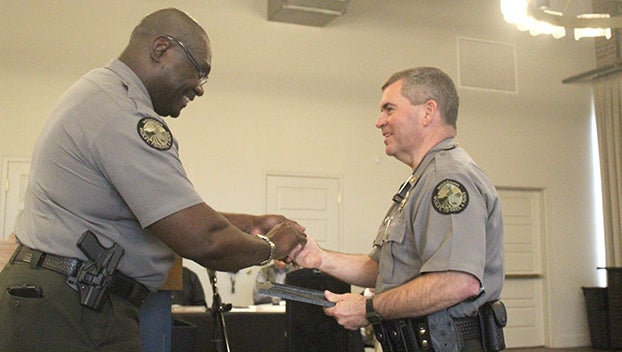Doty’s hospital bill finds a pulse
Published 10:29 am Friday, March 10, 2017
A hospital bill that almost died earlier this week got a second chance in the Senate and is headed back to the House for its approval.
The bill that allows the state to withhold income tax refunds from state residents who owed hospitals — like King’s Daughters Medical Center — and community colleges passed in the Senate Thursday by a 32-16 vote.
A 24-23 vote Wednesday almost killed it, but it was held on a motion to reconsider, meaning the Senate could take another vote Thursday.
Sen. Sally Doty, R-Brookhaven, has been pushing for this bill to become a law for six years. She was happy to see it creep closer to Gov. Phil Bryant’s desk for his signature.
“A couple of Legislators who supported the bill were out of the chamber yesterday (Wednesday) when we voted right after the lunch break,” she said.
Doty also visited with several other senators Thursday morning and answered questions they had regarding the bill.
The bill says that those who owed debts greater than $100 to non-profit hospitals and $25 to community colleges could have portions of their tax refunds withheld to repay the debt. This practice is already in place for child support debt and uncollected four-year university debts.
Doty defended the bill on the Senate floor Wednesday. She said hospitals are subject to federal guidelines and laws that require them to treat patients without any assurance of an ability to pay, thus they should be treated differently than other entities.
If the bill becomes a law, it will be good news for KDMC, a non-profit hospital in Brookhaven that serves a five-county area and over 100,000 people.
Alvin Hoover, KDMC’s chief executive officer, said the hospital has worked hard to reduce bad debt from more than $24 million five years ago to just over $12 million in FY16.
“The setoff bill gives KDMC and other Mississippi hospitals the opportunity to collect bills that have had to be written off because those folks chose not to take advantage of financial assistance, refused to pay any portion of their bill, and took advantage of the hospital’s goodwill to provide healthcare before requiring payment for their services,” Hoover said.
He said that based on his previous experience with a tax debt setoff program, he expects KDMC to collect $1 million if the bill becomes a law. “That will make a significant dent in our bad debt,” he said. “We appreciate Sen. Doty’s efforts to secure passage of this bill.”
Doty said the debts collected will help KDMC.
“Even if they only collect 5 percent of their outstanding debt through this process, that money would help our hospital remain viable and keep costs down for others,” she said.
Last week, the bill was held on a motion to table by Sen. Michael Watson, R-Pascagoula, who questioned the legality of adding hospitals to the legislation. On Wednesday, after consultation with Senate attorneys, Lt. Gov. Tate Reeves ruled the point of order not well taken, allowing Doty to move forward in defense of the bill and giving the Senate body the go-ahead to vote on the issue.
Watson’s motion was that the hospital portion was not relevant to the original bill. Doty argued that the original bill allowed several categories of claimants and the hospital language was well within the original subject matter of the bill.
Prior to the failing vote, three senators spoke on the floor against the bill, including Sen. David Jordan, D-Greenwood.
Doty addressed questions from several Democrats who were concerned about the effect of the bill on the poor. She explained that a non-profit status requires both public and private hospitals to write off significant portions of hospital bills and gave specific examples of bills already being reduced by 75-80 percent. These reductions are based on income as compared to the federal poverty guidelines, she said. Additionally, Medicaid and Children’s Health Insurance Program recipients would not be subject to the provision.
Sen. Briggs Hopson, R-Vicksburg, expressed his concerns over the bill last week. He said he was in favor of community colleges having this ability but was concerned about non-public entities claiming state tax refunds. He said he was worried that it would start a slippery slope for private hospitals and wondered if it would start a pecking order of who could collect income tax in the private sector.
“I reminded Sen. Hobson that the bill only allowed non-profit hospitals to use that procedure,” Doty said.
Hopson successfully introduced an amendment Wednesday that would place the ability of public hospitals to collect debt as a priority over that of private hospitals.
After a parliamentary inquiry, Reeves ruled that a three-fifths vote was required in the Senate since the bill included a revenue feature. The bill requires the claiming hospital to pay 10 percent of any amount collected to the Department of Revenue. Then an amendment filed by Watson was voted down and the bill passed with the 32-16 vote.
The bill now heads back to the House for concurrence or nonconcurrence, Doty said.






